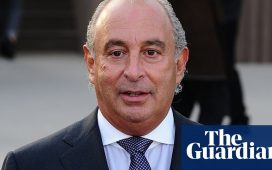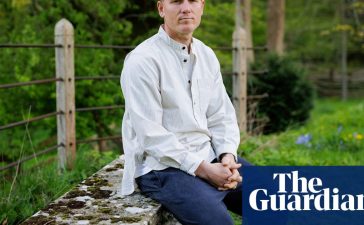It was autumn 2020 when someone from TV Licensing knocked on Josiane’s door. She was on maternity leave with her daughter, who was born that January, and had recently moved into a flat of her own, having previously lived in shared accommodation. Her first thought was: “I don’t want to get Covid,” she remembers. “I was terrified of getting ill. I was a single parent, I didn’t have family around, what would happen to my baby?”
She had bought a TV two weeks earlier, but was unaware that she needed a licence for it. “It had always been in my rental agreement,” she says. I meet her in a cafe in Basildon, near her home, with her daughter, who has just turned four, and her boyfriend, Giuseppe. “Maybe people who were born here know these things,” she says, and Giuseppe chips in, “it’s not something they teach you when you move to the UK.”
TV Licensing’s prosecutions have targeted some shockingly vulnerable people. One man’s licence ran out while he was in hospital for 11 weeks, and despite renewing it as soon as he was discharged, he was prosecuted six days later. One woman with a brain injury was prosecuted when she forgot to pay. Many of the most egregious cases have been collated by the Evening Standard’s courts correspondent, Tristan Kirk, the Alan Bates of, not just TV licensing, but the entire Ministry of Justice, who refuses to let “conveyor belt justice” go. Kirk refers to the Single Justice Procedure (SJP), which was brought in for minor criminal offences in 2015 and replaces the open court – consisting of two or three magistrates, a legal adviser and a prosecutor – with one magistrate, often working from home, and one legal adviser. You cannot watch these proceedings, and often a magistrate will hand out identical fines for quite different offences. TV licence offences are just one area of injustice: campaigners against the procedure are also very sceptical about the punishments that were handed out during Covid.
Kirk describes cases that, honestly, if you’re a person who believes themselves to be living under the rule of law, will put hairs on your chest. “The one that always comes to mind was a woman with Down’s syndrome,” he says. “Greenwich council pleaded guilty on her behalf, because it manages her finances. Any prosecutor looking at that would think: ‘Hang on a minute, this woman doesn’t have control over her own finances. At the very least, we need to investigate more.’ But a prosecutor wasn’t involved. They can, as I understand it, log on to the system and look at the mitigation. But they don’t.”
Since the prosecutor is no longer at the hearing, all those mitigating circumstances – the mental health problems, the learning disabilities, the illness, which TV Licensing might once have heard, and maybe responded to with an application to adjourn – are now only seen by the magistrate, who can’t withdraw the case. “They could refer it to open court, but by and large they don’t,” Kirk says. “That’s where I see the big flaw in the system, you’ve got no prosecutor in the room or involved at all, and magistrates who don’t think they can do anything about it.”
A TV Licensing spokesperson said: “We will not prosecute anyone if we receive evidence that shows us there are significant reasons – such as mental health issues or severe financial hardship – why they could not obtain a licence.” You can sympathise with their predicament, even. By the time the mitigating circumstances come to light, if they ever do, under the SJP, the prosecutor is no longer involved.
I realise when I meet Josiane how sick I am of words such as “victim” and “vulnerable”, which seem to distribute responsibility evenly across unjust situations. Yes, she was the victim of a faceless and unresponsive bureaucracy, and technically, yes, as a migrant single parent, she was also vulnerable. But she is a robust and competent person and none of this situation was of her making.
The man who came to visit her from TV Licensing was reassuring, and advised her to use PayPoint, a system where you pay bills at a corner shop. It wasn’t convenient in the middle of a pandemic with a baby. “I told the BBC I wanted to set up a direct debit, and I got a confirmation email.” Only one payment was ever taken. “It’s one of those small bills, you don’t think too much about it. So I didn’t check after that.” Then in March 2021, she received a letter. It read “How do I appeal?” She thought: “Appeal what?”
Like nearly 1,000 people a week, 70% of them women, Josiane had been prosecuted for TV licence fee evasion. It is the most common crime in the country, apart from driving offences. A fifth of all criminal prosecutions brought against women are by TV Licensing, which has extraordinary explicit powers – it can apply for a warrant to search a property, for instance. It also has inferred powers: people generally accept their doorstep interrogation, even while legally licence-free people (those who only watch streaming services to which they’re subscribed, for instance) are under no obligation to do so.
Tara Casey, a lawyer for the Women’s Justice Initiative at charitable law practice Appeal was working on an ultimately successful campaign to prevent imprisonment for non-payment of council tax when she first became interested in TV licence prosecutions. Even though numbers dipped a little during Covid, “we are still looking at tens of thousands of women each year facing criminal charges for not paying their licence fee.” The gender disparity was so obvious that the BBC conducted reviews in 2017 and 2023; and now, “the disproportionality is getting worse,” says Casey.
Peter Jones, 43, is based in Tyne and Wear and is the lead author of a TV Licensing blog, which aims to “highlight the unjust persecution of legitimate non-TV users”. Accidentally or not, he says it’s built into the system that those with the least will be caught in the net. “Those on lower incomes – generally unemployed people, single-parent households, elderly people, those suffering illness or disability – are more likely to be at home during the day if a TV Licensing officer arrives to make inquiries. For that reason they are more likely to be interviewed under caution and face prosecution for alleged TV licence evasion.” Ninety per cent of single parents are women, which might go part of the way to explain the very pronounced gender bias. In another case, one submission of evidence for the prosecution of a woman in Bristol read: “I am suffering from severe depression, since the loss of my daughter in 2022. I have no family or friends.”
The BBC told a select committee in 2017 that every 1% reduction in licence fee evasion raised £40.5m in revenue, so there is an obvious financial motive to prosecute as a deterrent. The evasion rate has been steadily climbing since Covid and is now at 10.3%; the cost-of-living crisis can’t have helped. Jones points out that BBC revenue has actually increased despite this, because of a £1.50 rise in the licence fee in 2021. It might be an idea to ask the people who can afford it to pay more, rather than hound and make examples of those who can’t.
This is more or less what TV producer Peter Bazalgette suggested last month, replacing the “regressive” flat fee with a tax in which the wealthier paid more, whether they had a TV or not. Bazalgette and broadcaster Greg Dyke recently had a debate in which Bazalgette also floated the idea of a German system, in which businesses paid towards the public broadcaster, as a contribution to civic society.
The situation as it stands has that unmistakable tang of a public-private partnership where civic values have fallen through the cracks. Whatever you think of the BBC, it takes its responsibility as a public service pretty seriously. It’s hard to imagine, if it were drawing up a system from scratch, that it would want to be the Sheriff of Nottingham, flexing its might by prosecuting a woman with learning disabilities who sometimes forgets what she is meant to pay (as detailed in one SJP evidence submission from County Durham).
The government scrapped plans to decriminalise licence fee non-payment in 2021 and TV licensing has been outsourced to Capita for more than 20 years, which has targets on reducing the evasion rate in its contract. The contract, worth £456m, was renewed in July 2022 to run until 2027. Jones also notes that individual TV Licensing officers “receive bonuses for any TV licence sales they generate during their visits. They can only generate a sale, and thus earn a bonus, if they take a statement from the occupier of an unlicensed property. This means that there is a pecuniary advantage for individual officers to gather evidence of evasion whenever they can – be that by hook or by crook.”
TV Licensing denies that it has any incentive to prosecute: “Neither TV Licensing as a whole, nor individual visiting officers have any incentives to achieve a certain number of sales or prosecutions, take a certain number of records of interview, nor generate court income.”
None of that means the BBC is forced to prosecute. Dennis Reed is director of Silver Voices, a non-profit campaign group for the over-60s. In July 2020, free TV licences for the over-75s were scrapped. “We had lengthy negotiations with the BBC director-general and his top team,” Reed says, but “so far, no success.” As a result of a Silver Voices campaign, “loads of over-75s refused to pay,” he says. He estimates that between 200,000 and 250,000 over-75s have not paid their fees since the free licences were abolished – and as yet there have been no prosecutions. Reed thinks part of that is about optics. “What would that look like, if they took an 85-year-old with dementia to court?”, he says, but adds: “If they’ve brought in an unofficial amnesty, without asking who else is struggling, how ethical is that?”
Josiane’s experience distils a Kafkaesque facelessness, once the gears of justice have been set in motion: “I was talking to the BBC, saying I was happy to pay, happy to pay a penalty. Money was a problem, but going to court would be more expensive, so I was prepared to borrow the money. I got through to people, but they constantly said: ‘I’m sorry I can’t help you. Maybe you could raise this with your lawyer.’ I didn’t understand why we couldn’t solve it. I thought, maybe it’s my accent. Am I not assertive enough? Am I not clear enough? It makes you feel sad, if you can’t reason with people. Maybe speaking to a machine would have been better.”
Penelope Gibbs is director of Transform Justice, and says there are two clear criteria for any prosecution: “That it is in the public interest, and that there is evidence of a crime having been committed. You can’t determine the public interest without having information about the person who is suspected of the crime.” This is where the SJP comes in, and it’s catching hundreds of thousands of people, most of whom don’t respond. It varies according to the crime, but in some offences, non-response rates are as high as 75%, all of whom will then be found guilty. “It’s ludicrous,” Gibbs says. “They don’t even know if the person received the prosecution notice, it’s not even sent via registered post. They don’t know if that person has mental health problems, doesn’t speak English as a first language, whether they are homeless. They don’t know any of those things.”
Kirk has taken this up as a cause, and explains: “The system was set up in 2015, the numbers have ramped up over the past five years and they are vast. There were three-quarters of a million cases in 2019, and this year looks like it’s also running at that speed.”
Josiane, with the help of Appeal, eventually got the charges against her dropped. “Everything comes with a blessing,” she says, with a baffling focus on the bright side. “I have learned a lot from it. I have met a lot of good people.” Her boyfriend, Giuseppe, is more sceptical. “She can set up a direct debit but she doesn’t trust it. So every month, she has this PTSD response: ‘Have I paid my TV licence?’” It’s slightly more than every month, Josiane admits, ruefully. “Every time I see the logo I get a flashback.”










